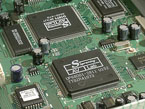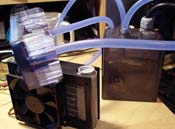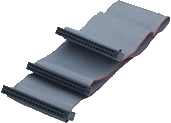Click here to see a list of previous articles.
Click the image to see larger version
A Crash Course in Gaming Machines
"Bleeding edge." It's a term used to describe technology so leading, it will make your wallet bleed. For gamers, making the wallet bleed only proves how much they rule -- at least in their own world. More to the point, it provides them with a machine that will run the latest games with the highest options for a quality that makes one's eyes drool. So how do you know what to get?
The key things to consider are:
- CPU
- Chipset
- Video card
- Cooling system
CPU

 Thankfully, this is a fairly easy field. You basically have two options: AMD or Intel. Then, which AMD or Intel chip do you get? There are 64 bit chips out by both manufacturers. It sounds good: If fast 32 bit CPUs can make my machine run pretty quickly, a 64 bit will make it go twice as fast! The screeching you're hearing is the brakes on the logic machine. The 64 bit CPUs run at 64 bits, but the operating system and games you run these days operate at 32 bits. So, that extra 32 bits is lying around, waiting to be used, but never will be with the current Windows operating systems and games (Linux supports 64 bit processors). If you want fast, 64 bit CPUs won't do much for you until you get a 64 bit OS running 64 bit games. We're a good 2-4 years before that happens, if we're lucky. Generally speaking, AMD makes an awesome CPU and they do tend to sell for less than the Intel variety. If I were to pick a CPU, it would be a high-end AMD.
Thankfully, this is a fairly easy field. You basically have two options: AMD or Intel. Then, which AMD or Intel chip do you get? There are 64 bit chips out by both manufacturers. It sounds good: If fast 32 bit CPUs can make my machine run pretty quickly, a 64 bit will make it go twice as fast! The screeching you're hearing is the brakes on the logic machine. The 64 bit CPUs run at 64 bits, but the operating system and games you run these days operate at 32 bits. So, that extra 32 bits is lying around, waiting to be used, but never will be with the current Windows operating systems and games (Linux supports 64 bit processors). If you want fast, 64 bit CPUs won't do much for you until you get a 64 bit OS running 64 bit games. We're a good 2-4 years before that happens, if we're lucky. Generally speaking, AMD makes an awesome CPU and they do tend to sell for less than the Intel variety. If I were to pick a CPU, it would be a high-end AMD.
Chipsets
 Not many people think of the chipset when considering a fast computer. If you aren't familiar with chipsets, think of a few sets of a road grid: the one that has the traffic lights in sync will allow for better throughput of traffic. If the chipset doesn't govern the traffic very well, you'll see a grid that is much slower than the grid that has better traffic management. In fact, an instructor of mine once noted that he saw a 386 16mHz machine run faster than most 486s he used and attributed this astonishing comparison to the under-appreciated chipset. So, how can you tell which chipset suits your needs? Again, referring to a search engine, you can look for "chipset comparisons 2005". I add a "2005" to include the year, as there are thousands of chipset comparisons out there, and you don't want to be looking at a dated one. Also, talking to the person in sales at the computer store can help a lot. They tend to be pretty knowledgable in these areas and, of course, they will have the latest info on the latest chipsets. Don't be too overwhelmed by the notion, though. All you want to know is, "Which one performs the best, or at least, very well?" Chipsets come attached to the motherboard, so when you speak of chipsets, recognise that they are just the chips that sit on the motherboard.
Not many people think of the chipset when considering a fast computer. If you aren't familiar with chipsets, think of a few sets of a road grid: the one that has the traffic lights in sync will allow for better throughput of traffic. If the chipset doesn't govern the traffic very well, you'll see a grid that is much slower than the grid that has better traffic management. In fact, an instructor of mine once noted that he saw a 386 16mHz machine run faster than most 486s he used and attributed this astonishing comparison to the under-appreciated chipset. So, how can you tell which chipset suits your needs? Again, referring to a search engine, you can look for "chipset comparisons 2005". I add a "2005" to include the year, as there are thousands of chipset comparisons out there, and you don't want to be looking at a dated one. Also, talking to the person in sales at the computer store can help a lot. They tend to be pretty knowledgable in these areas and, of course, they will have the latest info on the latest chipsets. Don't be too overwhelmed by the notion, though. All you want to know is, "Which one performs the best, or at least, very well?" Chipsets come attached to the motherboard, so when you speak of chipsets, recognise that they are just the chips that sit on the motherboard.
Video Cards
 A few years ago, there was a bit of a battle between vendors' hardware: which one would make your game faster and which one did your game support? You could purchase one high end card and it would work great on some games, but other games would require the competition's hardware. It was a bit exasperating, to say the least. Thankfully, this is not so much of an issue these days, so we're back to the, "Which graphics card has the best performance and how much am I willing to part with?" Video cards can surpass $1,000 for seriously high end equipment, but generally speaking, for excellent results in gaming, you're looking at $400 - $800. So what kind of video card do you get? Video cards come out with a fair degree of consistency, so while there are faster versions or cards with more features that will come out after you get yours, the capabilities are not that great as to render your card of little use in little time. Generally speaking, you get what you pay for. Finding sites that do comparisons of video cards may point you in the right direction (use a search engine, look for "video card benchmarks" or "video card comparisons." Even for gamers, everyone's needs vary on the individual. For respectable results, you can spend about $200 on a video card and get pretty good gaming capabilities. Again, the more you spend, the more you can do. I have an ATI Radeon 9000 Pro purchased in early 2003 that can play the latest graphic-intense games okay(think Doom 3) and all other types of games very well. It cost roughly $159 at the time. If I had spent $400, it would play these games with blazing speed and amazing quality. Lastly: If your card has an AGP slot, get an AGP card. The bus speed is much faster.
A few years ago, there was a bit of a battle between vendors' hardware: which one would make your game faster and which one did your game support? You could purchase one high end card and it would work great on some games, but other games would require the competition's hardware. It was a bit exasperating, to say the least. Thankfully, this is not so much of an issue these days, so we're back to the, "Which graphics card has the best performance and how much am I willing to part with?" Video cards can surpass $1,000 for seriously high end equipment, but generally speaking, for excellent results in gaming, you're looking at $400 - $800. So what kind of video card do you get? Video cards come out with a fair degree of consistency, so while there are faster versions or cards with more features that will come out after you get yours, the capabilities are not that great as to render your card of little use in little time. Generally speaking, you get what you pay for. Finding sites that do comparisons of video cards may point you in the right direction (use a search engine, look for "video card benchmarks" or "video card comparisons." Even for gamers, everyone's needs vary on the individual. For respectable results, you can spend about $200 on a video card and get pretty good gaming capabilities. Again, the more you spend, the more you can do. I have an ATI Radeon 9000 Pro purchased in early 2003 that can play the latest graphic-intense games okay(think Doom 3) and all other types of games very well. It cost roughly $159 at the time. If I had spent $400, it would play these games with blazing speed and amazing quality. Lastly: If your card has an AGP slot, get an AGP card. The bus speed is much faster.
Cooling System
 These are the things that keep your system especially cool in times of need. This is another field where new systems are offered every month, it seems. The nice thing is that whatever you get, if it does the job well now, it will continue to do the job just as well -- providing you maintain it by cleaning your case out now and then. The basic cooling system in a computer is a fan. You all hear them every day. They are the whirring sound you hear in a computer when it sits seemingly idle. But if your CPU already has a fan, what do you need a cooling system for? Think of a two-storey house with an air conditioner in the master bedroom during a heatwave. It works great for the bedroom, but the rest of the house is melting and if the rest of the house isn't comfortable, you're going to feel it. You can cool your case down in a number of ways: adding more fans to your hard drives, to your graphics cards, your CPU and to your case. The will all help make the air flow out of the case faster, thus keep your components less hot. It will also make a lot of noise. So, you can go for a water-cooled system (yes, water-cooling is available for your computer). A couple of such examples can be seen here, here and definitely here. My suggestion would be to find the quietest components and means of cooling you can. One or two fans in your computer can make substantial decibels, but adding even more fans will drive you bonkers unless the computer is in its own room and you only use it for gaming.
These are the things that keep your system especially cool in times of need. This is another field where new systems are offered every month, it seems. The nice thing is that whatever you get, if it does the job well now, it will continue to do the job just as well -- providing you maintain it by cleaning your case out now and then. The basic cooling system in a computer is a fan. You all hear them every day. They are the whirring sound you hear in a computer when it sits seemingly idle. But if your CPU already has a fan, what do you need a cooling system for? Think of a two-storey house with an air conditioner in the master bedroom during a heatwave. It works great for the bedroom, but the rest of the house is melting and if the rest of the house isn't comfortable, you're going to feel it. You can cool your case down in a number of ways: adding more fans to your hard drives, to your graphics cards, your CPU and to your case. The will all help make the air flow out of the case faster, thus keep your components less hot. It will also make a lot of noise. So, you can go for a water-cooled system (yes, water-cooling is available for your computer). A couple of such examples can be seen here, here and definitely here. My suggestion would be to find the quietest components and means of cooling you can. One or two fans in your computer can make substantial decibels, but adding even more fans will drive you bonkers unless the computer is in its own room and you only use it for gaming.
Hard drives

 The speed of hard drives is important, but these days, most hard drives come with a built-in buffer and pretty fast speeds. You'll want a minimum 7200 RPM hard drive. Make sure your motherboard supports SATA. When installing, there is nothing like adding an SATA hard drive as opposed to the old IDE or SCSI drives. They look exactly the same on the surface, however, the cables are smaller(as evidenced by the image of the SATA cables on the right versus the IDE cables on the left). SATA will give SCSI or IDE a run for its money when it comes to throughput. Seagate and Fujitsu have been making hard drives for a very long time. Both make good drives and Fujitsu offers 3 year warranty on some of its drives. Thankfully, hard drives don't cost very much, in comparison to the upper-end video cards.
The speed of hard drives is important, but these days, most hard drives come with a built-in buffer and pretty fast speeds. You'll want a minimum 7200 RPM hard drive. Make sure your motherboard supports SATA. When installing, there is nothing like adding an SATA hard drive as opposed to the old IDE or SCSI drives. They look exactly the same on the surface, however, the cables are smaller(as evidenced by the image of the SATA cables on the right versus the IDE cables on the left). SATA will give SCSI or IDE a run for its money when it comes to throughput. Seagate and Fujitsu have been making hard drives for a very long time. Both make good drives and Fujitsu offers 3 year warranty on some of its drives. Thankfully, hard drives don't cost very much, in comparison to the upper-end video cards.
Summary
What you spend depends on your needs. You don't have to spend a lot to get a nice system, but again, the more you spend, the more capabilities you'll have. The question is: are these capabilities that important? Is playing a game at 1024 x 768 worth a few hundred more or will playing them at 800 x 600 suffice? The high end results are wonderful to see, but there's always the financial trade-off. Mind you, if you get the bleeding edge stuff, there will be so many times where you will find yourself muttering under your breath, "ohhhhhhhhhh, baby." Nothing like seeing a World War 2 re-creation or car simulation program looking like the artwork it was meant to be. It's truly a beautiful thing.Also, you will not find very knowledgable salespeople at Future Shop or Best Buy or any of those types of large stores. Go to a computer store that can sell you all these parts. They tend to be smaller, but they know their stuff and can put the system together for you if you like (for a small fee). Also, don't be afraid to look around. Even though smaller stores have the stuff you want, some stores have a questionable reputation that, frankly, I would hate for you to find out on a first-hand basis. So take your time when asking questions, particularly to what end they support their products and their workmanship. This sort of approach is applicable in any industry.
Finally, if you wish to get a lot more detailed in your gaming machine research, there is more expansive article on Informit's site that you can access by clicking this link.
Next week, we're taking a break from all this serious stuff and give you a nice dose of humour coming from all things related to the tech field. Who said geeks can't be funny?
If you'd like to stop receiving this newsletter, click on the unsubscribe link below (it will bring up an e-mail to me) and just click send. Conversely, if you think someone else could benefit from receiving this, feel free to forward this mail to them. If you don't receive this currently and would like to subscribe, click on the subscribe button below and click on send.
If you have any comments, questions or concerns about this newsletter, feel free to e-mail me at sean@beggs.ca.
If you would like to UNSUBSCRIBE to this newsletter, click here or send an e-mail to sean@beggs.ca with "unsubscribe" in the newsletter.
If you would like to SUBSCRIBE to this newsletter, click here or send an e-mail to sean@beggs.ca with "subscribe" in the newsletter.
© Copyright 2005, Sean Beggs


